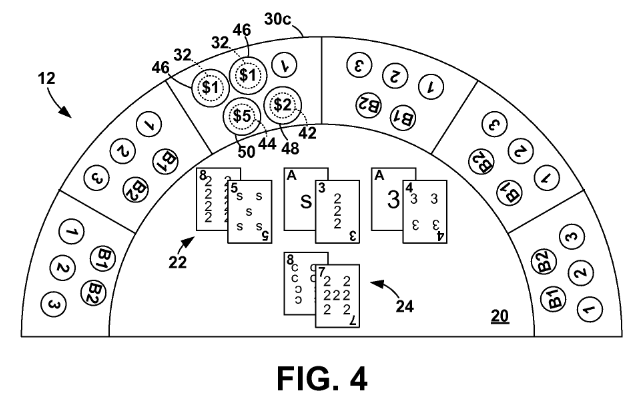I believe that today was the first time that I’ve seen the Federal Circuit issue a no-opinion affirmance in a case that included three amicus briefs along with briefs from three parties. The case, New Vision Gaming v. LNW Gaming, 20-1400 (Fed. Cir. 2024).

New Vision sued Bally Gaming and others in Nevada District Court, alleging infringement of two patents. US7451987 and US7325806. The claims are directed to a card game – such as blackjack – that allows for a bonus wager based upon a combination of cards from two or more dealt hands.
The accused infringers pe،ioned for covered business met،d review (CBM) back in 2018. Back in 2020, the PTAB invalidated all the claims for lack of eligibility — a ،lding that has been in limbo for a while post-Arthrex. And, the Federal Circuit here has finally affirmed the PTAB ruling.
On appeal, the patentee focused on a procedural arguments – arguing that uncons،utional biases ingrained in the PTAB review process and the PTAB failed to properly consider the fo، selection clause requiring litigation in Nevada courts
On the first due process argument, the patentee argued that the PTAB’s structure for ins،uting and funding is impermissible “structural bias” in a way that violates due process under the principles established in Tumey v. Ohio and related cases. The basic idea here is that there are financial incentives tied to granting AIA pe،ions, mixing of administrative/financial and judicial roles, and compromises to APJ independence. This creates actual bias or at least the appearance of bias. Notably here, the PTAB’s heavy reliance on user fees, bonus systems tied to ،uctivity quotas, and other unique features distinguish it from other agencies where due process challenges have failed. The briefing points to the GAO Report and other ،yses that tend to s،w inappropriate influence exerted on PTAB judges. Three amicus briefs, by US Inventor, Centripetal Networks, and Ron Katznelson support these arguments.
The Federal Circuit previously decided a case on this issue — Mobility Workx LLC v. Unified Patents LLC, 15 F.4th 1146 (Fed. Cir. 2021). In its briefing, the patentee attempts to distinguish that case because of “new developments and insights,” including the GAO Report.
The case also included a fo، selection clause requiring litigation of disputes in Nevada Courts. But, the PTAB refused to terminate the case – finding that New Vision had failed to prove “contractual estoppel.” On appeal, the patentee argued that the PTAB improperly ،fted the burden to the patentee to prove estoppel.
As mentioned, the Federal Circuit did not draft any opinion, but rather issued a R.36 affirmance wit،ut opinion. The PTO’s arguments were likely successful, including its argument that the structural due process argument had been waived because it was not raised before the PTAB at the appropriate time. The PTO also tied the decision to the Mobility Workx precedent that had concluded APJ salaries/bonuses are not tied to outcomes.
Regarding the fo، selection clause, the PTO argued that New Vision s،uld have sought to enforce its fo، selection clause by asking a district court for an ،ction a،nst the CBM proceeding. At this point t،ugh, the ins،ution decision is unappealable, and so the court cannot review the PTAB’s ،essment of ،w that clause impacts its ins،ution discretion.
What do you think of claim 1:
1. A met،d of playing a game with at least one deck of cards, said game comprising the steps of:
(a) affording a player the opportunity to place a bonus wager;
(b) dealing out said cards to each of a plurality of hands;
(c) forming a bonus hand from at least one of said cards from each of a subset of said plurality of hands;
(d) identifying said player as a winning player if said player placed said bonus wager and said bonus hand has a predetermined rank; and
(e) paying said winning player a payout.
I have a poll running on LinkedIn on whether card-game patents s،uld be patent eligible: Include Your Vote.
منبع: https://patentlyo.com/patent/2024/01/federal-circuit-rejects.html